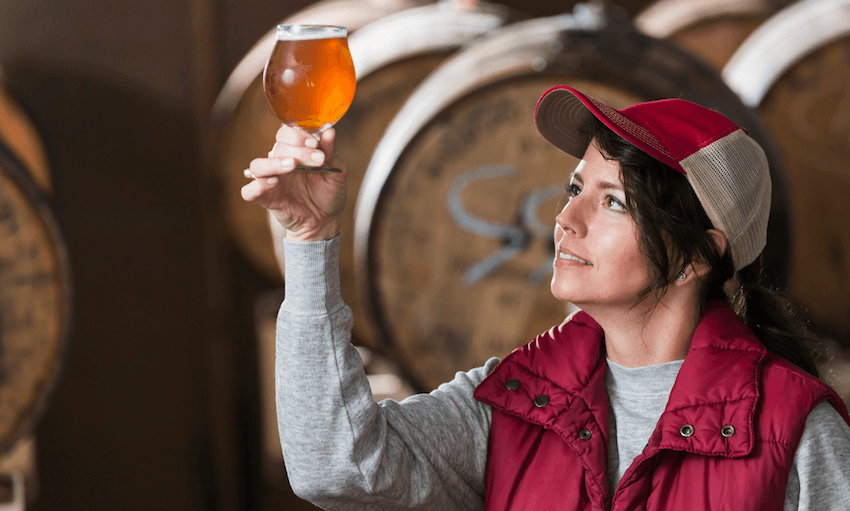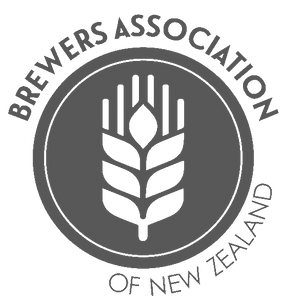Five women talk about challenging stereotypes in New Zealand’s ever-evolving beer scene.
When Nicola Kay started her first brewing job, there were no women’s toilets. There had never been the need.
It was the early 2000s, and Kay was working for Lion in Sydney. She’d been running the tasting panels at Lion New Zealand, then became team leader of the lab here before heading across the ditch.
“When I moved to Australia, I was really trying to get into the manufacturing side of things, so I applied for a role as a brewing team leader,” she explains. “I got this comment that oh no, they couldn’t possibly give me that role because I’d get eaten alive. At the time the brewing department there had no females.”
So she worked for another few years in the lab in Sydney before finally breaking into the brewing department. And toilet issues aside, Kay didn’t mind being the only woman. “I don’t know whether it’s that New Zealand attitude of you just crack on with it and don’t think too much about it, but I never really found it an issue,” she explains.
“It’s once I started added children into the mix that I went, ‘Oh, maybe we haven’t quite got this gender thing sorted out’.”
Now craft beer services leader for Lion New Zealand and a mother of a four-year-old and an eight-year-old, Kay has worked her way up the ranks over the past 20 years, interspersing her Lion roles with a four-year stint in the UK working for Molson Coors Brewing.
Juggling work and parenting has given her a new perspective on gender equality, she says. “It’s just coming to the realisation that we’ve made lots of progress in the workplace, but maybe we haven’t made quite so much in the home.
“I don’t think it’s specific to the brewing industry, it’s that larger societal thing of women typically taking more of a share of the household duties. It’s definitely a conversation my husband and I are having — how do we make it more even?”
In terms of gender balance, ratios are definitely improving in the brewing industry, says Kay, who points out that she’s worked with more women in the past six years she’s been back in New Zealand than the 15 years prior. But as a senior member of the Lion team, she finds herself very much in the minority at leadership meetings.
“It’s been a bit slow getting more senior women. I think the challenge is how to get females progressing through their careers and not dropping out at certain levels.”
However, the big breweries are making significant moves to ensure equality in the workplace is at the forefront of their businesses. In July, DB announced it had reduced its gender pay gap to 0%, down from a 6.1% gap last year. The project took more than three years of work to finally reach parity. Lion corrected its pay gap in 2016, and is committed to addressing the inherent issues that created it. It has extended maternity leave and incorporated flexible working hours for parents.
“We’re enabling people to work from home a lot more and to do the hours wherever it fits. That’s been amazing,” says Kay.
Changing attitudes regarding who should drink beer are positive too — there are still lingering preconceptions, but we’ve grown in leaps and bounds in a couple of decades. “Twenty years ago, I remember going to parties and being in a cocktail dress and drinking a beer, and getting comments like ‘Oh, that looks a bit weird’,” says Kay.
Old habits die hard, however. Lucie Campbell, who runs The Lumsden Freehouse, a craft beer pub in Auckland’s Newmarket, says, “I often play dumb when I go into other bars just to see what they will offer me, and I get pushed towards the cider or the wine, or get given a half pint when I asked for a pint. It’s just sort of ingrained in people that that’s what women want or should be given.”
Campbell has been involved with the New Zealand branch of the Pink Boots Society, the international organisation that supports women working in the beer industry, since it began four years ago. She says until the beer industry is more reflective of a society as a whole, we need to strive for change.
“It’s still a man’s world. While we’re growing, we’re still very much a minority within the industry. I spend a lot of time going to beer events and I’m the only female there. Until we walk into an event and it’s 50/50, there’s still a need for it.”
Natasha O’Brien, brewing manager at DB’s Waitematā Brewery, agrees that attitudes are changing.
“I grew up in the 80s when if you went to a barbecue, the men were happily drinking handles of beer and the women were drinking wine coolers — they might branch out and have a shandy if they were feeling a bit adventurous.
“But I think perceptions have changed, and the emergence of the craft industry has helped greatly.”
Like Kay, O’Brien’s first job was on an all-male brewing team, and over the years she has experienced sexism in the workplace — mainly while working overseas.
“It’s been an extremely small part and it definitely hasn’t defined my experience,” she says. “It’s not an industry-specific thing — sadly, I think that any woman can experience that in any role.”
What stands out for her much more than the sexism is the camaraderie she’s built with her colleagues, says O’Brien. “In the early days I rolled kegs and lifted 50-kilo malt sacks, which for someone of my size and stature was physically tough, but I had good support from my male colleagues. I certainly pulled my weight on the team — I didn’t shy away from any of that stuff — but I also wasn’t too precious to accept help when it was offered.”
She now leads a team of 12, with only one female brewer. “Women are still underrepresented in the industry, but it is changing from when I first started 20 years ago. It will take time, but the diversity will definitely improve.”
More stringent health and safety standards have helped, making the job less physically demanding. “There are better ways of doing things now, which has created a more level playing field for women. There are no restrictions.”
The idea that beer is a men’s domain remains, however. “I’m still met with surprise when I tell people what I do,” says O’Brien, “so I think that does highlight that perceptions are still there.
“But mostly it’s been really positive. If I’m at a dinner party and I say what I do, it instantly grabs attention, probably because it is uncommon. But people are positive about it — they’re like, ‘Wow, that’s really interesting, what a great job.’”
Beth Park also finds that being a female brewer piques people’s interest. Now safety, health, environment and quality manager at DB Draught Brewery in Timaru, Park started out in DB’s brewery manager training programme in 2000, when three out of the four graduates taking part were female (one was Natasha O’Brien). “It was probably a bit unusual at that time,” she admits.
She says people outside the industry have always been more surprised by her choice of career than those in the beer world, and working in mainly male environments hasn’t fazed her. “I’ve never really worked in a female environment so I don’t know any different — and I grew up with brothers.”
Being small in stature, she says some of the physical aspects of her career have posed more challenges to her than they might have to her male counterparts, but she’s found “smarter ways of adapting”.
Park takes heart from changing perceptions around beer drinkers. While in the past, she often received comments like “good to see a chick who loves her beer!”, she’s now more likely to be asked about why she’s chosen a certain style of beer. “Years ago I think you were seen as a bit of hard case. You’re not an anomaly to be drinking beer any more.”
Since the start of her career, Park has been eager to educate consumers about beer’s potential. “I always viewed beer alongside wine for the attributes it had to offer, and I knew that would be a drawcard for females to be more interested in it, as something to appreciate rather than just consume. I really tried to push that early on.”
Not surprisingly, she welcomes the growth of the craft beer industry in challenging those perceptions. “I’ve seen a change in how people view beer, and that excites me.”
Kirsten Taylor, head brewer at The Fermentist, a new Christchurch microbrewery owned by Lion, agrees. “There are definitely a lot more interesting beers being made, and that probably has appealed to women more. There’s not the blokey image around beer that there was 25 years ago.
“In the last 10 years, it’s exploded as far as women are concerned,” she adds, estimating that The Fermentist’s clientele is at least 50% female.
Like the other brewers profiled, Taylor started out in the lab before moving to a practical role, and when she started at Canterbury Breweries 25 years ago, she was Lion’s first female brewhouse employee.
“There was a bit of bitchiness,” she says of the reaction from her new male colleagues. “A lot of people think women can be really bitchy, but it goes for males as well!”
But she didn’t dwell on it, and she and the men “got used to working with each other”, Taylor says. “They could definitely help me and add something to my learning, and I believe that I imparted some of my knowledge to them as well.”
It’s a common attitude among female brewers — get on with the job and don’t let anyone treat you any differently. “You’re defined by your ability, not your gender,” says Natasha O’Brien.
Or, as Beth Park sums it up, “I’m a brewer who just happens to be female, and there are a few of us around.”
This content was created in paid partnership with the Brewers Association. Learn more about our partnerships here.
This content was created in partnership with the Brewers Association of New Zealand. Find nutritional facts on New Zealand’s favourite beers here.*




